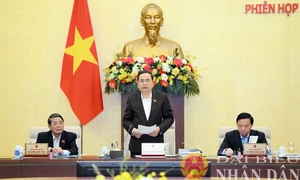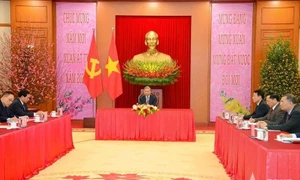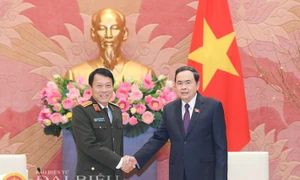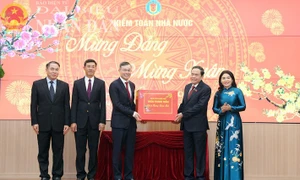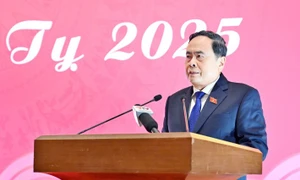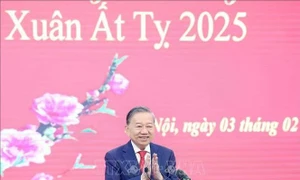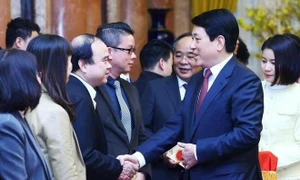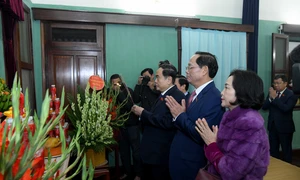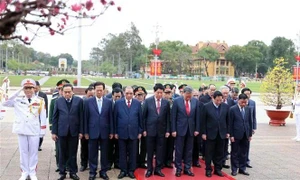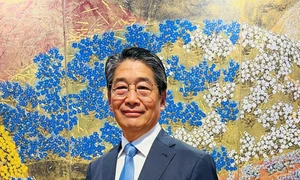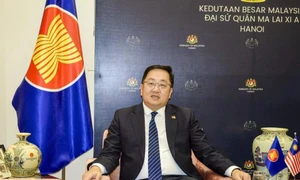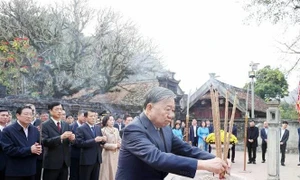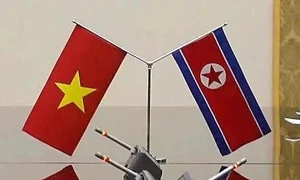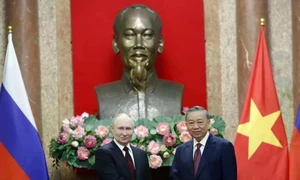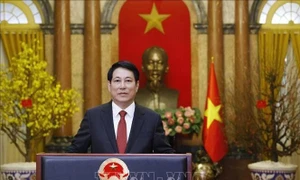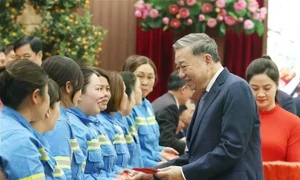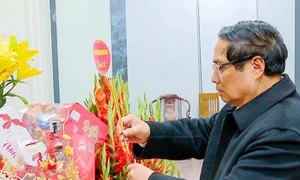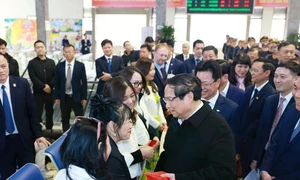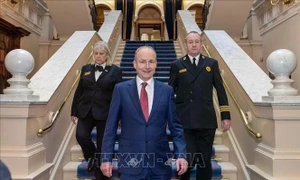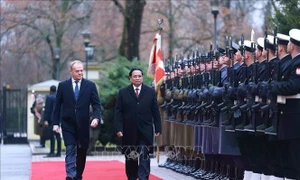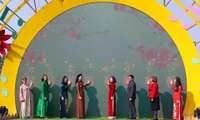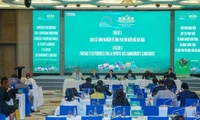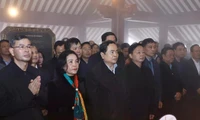The year 2024 left many hallmarks on the cause of national construction and development, with many strong and positive changes, breathing new wind into almost all activities in society and creating an important prerequisite for the entire country to make breakthroughs and accelerate the progress towards realising the set targets and firmly advance into a new era after the 14th National Party Congress. On the occasion of New Year 2025, State President Luong Cuong granted an interview to the Vietnam News Agency (VNA). The following is a translation of the interview:
Reporter: Over the past years, the Party and State have strongly carried out judicial reform. Could you elaborate on judicial reform’s contributions to the country’s socio-economic development achievements and measures for continuing to perfect a law-governed socialist State?
State President Luong Cuong: Judicial reform is an important content of the Party’s Doi moi (Renewal) policy, and an inevitable and continuous trend to adapt to changes in the situation, helping build and perfect the law-governed socialist State of Vietnam. Under the Party’s leadership, over the past years, our country’s judiciary has made positive strides and obtained significant results in various aspects. It has institutionalised the policies on enhancing crime prevention effectiveness and benevolence in handling criminals; reducing prison sentences and expanding the application of fines and non-custodial rehabilitation for some types of crimes; applying lighter sentences to juvenile offenders; limiting the death penalty to only certain types of particularly serious crimes; ending the criminalisation of civil and economic relations, and the omission of criminals and offenders; and perfected the regulations on expungement of criminal records to create favourable conditions for convicted persons to reintegrate into the community as soon as possible. The improvement of civil law has contributed to creating an equal business environment, protecting the rights and legitimate interests of organisations and individuals, along with the State’s interests and public interests; and creating fairness in civil and economic relations as well as the settlement of civil cases.
The legal regulations on judicial proceedings have been improved towards democracy, openness, transparency, facilitating and increasing people's access to justice, and eliminating injustice and mistakes in litigation activities. Recently, the Politburo agreed in principle on the policy of considering and improving the legal regulations on initiating civil lawsuits when the holder of civil rights is a vulnerable group or related to public interests but there is no one to initiate the lawsuit; on improving the effectiveness of applying simplified procedures, with the combination of non-judicial procedural methods with judicial procedural ones. The National Assembly passed the Law on Justice for Minors, helping build a child friendly and protecting legal system. The promulgation of the Law on Mediation and Dialogue at Court has created a new method of dispute resolution without having to open a trial, contributing to the settlement of conflicts and contradictions in civil and administrative relations in a friendly manner that maintains unity among the people. Besides, the resolutions on online trials and the pilot handling of evidence and assets during the investigation, prosecution and trial of a number of criminal cases... were also issued.
The organisation and operation of judicial agencies have been constantly innovated and perfected towards greater efficiency and effectiveness; the quality of litigation at court has been given more attention and increasingly improved. The special amnesty work has also received attention. Since 2021, the State President has granted amnesty to 9,236 prisoners, demonstrating the Party and State’s lenient and humane policy. The abovementioned results have made considerable contributions to promoting socio-economic development and international integration, defending justice, protecting human rights and civil rights, and firmly safeguarding the Fatherland.
In the coming time, to continue implementing Resolution No. 27-NQ/TW on building a law-governed socialist State of Vietnam in the new period; and strive to build a professional, modern, fair, strict, and upright judiciary serving the Fatherland and the people, judicial reform must be pushed ahead more effectively to better serve socio-economic development and national defence; and carried out in tandem with legislative innovation, state apparatus restructuring and administrative reform. In particular:
- The legal system must fully institutionalise the Party's policies and guidelines in a democratic, fair, humane, complete, harmonious, consistent, timely, feasible, open, transparent, stable, accessible, close to reality, and people and business-centred manner. (We) must continue to build and perfect legal regulations on preventing and combating corruption, wastefulness, and negative phenomena, and those on minors; while researching and developing a mechanism for controlling the issuance of by-law legal documents and considering the responsibility of those who issue documents causing serious consequences. (We) must work out a mechanism for initiating administrative lawsuits so that the court can make decisions in cases where state management agencies and the parties concerned do not implement or do not implement law properly, causing damage to public interests and the State’s interests. It is also necessary to review and evaluate legal regulations related to the death penalty and the execution of death sentences with a view to amending and supplementing them appropriately towards reducing the crimes subject to the death penalty; further improve the management, education and rehabilitation of prisoners; and better ensure and protect human rights for those serving sentences.
- The process of building a law-governed socialist State of Vietnam, including judicial reform, must bring into full play the people's right to mastery, protect human rights and citizens' rights; develop awareness and a lifestyle that respects the Constitution and the law in society; effectively enforce the principle that citizens are allowed to do everything that the law does not prohibit, and that citizens' rights are closely linked to citizens' obligations; thoroughly address injustice and mistakes in litigation; and ensure safety, openness and fairness in civil relations, paving the way for innovation, creativity and sustainable development. It is also necessary to continue to reform and improve the effectiveness and efficiency of supervision by the National Assembly, People's Councils and the Fatherland Front committees at all levels. On the occasion of major anniversaries in 2025, the Party and State will conduct special amnesty for prisoners with good behaviour.
Reporter: In 2024, Vietnam continued to engage in significant external activities to enhance the country's position. To date, Vietnam has established comprehensive strategic partnerships with nine countries, including four of the five permanent members of the United Nations Security Council. Could you please share the orientations for foreign affairs in 2025?
State President Luong Cuong: Looking back at the complicated and profound developments in the region and the world in 2024, we can see that Vietnam's foreign policy and diplomacy - based on the principles of unwavering adherence to the Party's leadership and the close cohesion of the three pillars: Party diplomacy, State diplomacy, and people-to-people diplomacy - have contributed to opening a new, broad and unprecedentedly favourable complexion for Vietnam's foreign affairs. Vietnam's foreign policy and diplomacy continued to affirm their pioneering role, contributing to the establishment and maintenance of a peaceful, stable environment, while safeguarding national independence, sovereignty, and territorial integrity, thus strongly supporting national development, elevating Vietnam's position, and enhancing its new stature and reputation. In relations with neighbouring countries, traditional friends, and key and important partners, both bilaterally and multilaterally, Vietnam builds on the experience and achievements of previous generations. The "Vietnam story" has increasingly attracted global attention and welcomed by international friends with admiration, respect, and goodwill. Notably, the United Nations General Assembly’s adoption of the UN Convention against Cybercrime, known as the “Hanoi Convention”, on December 24, 2024, which addresses a pressing issue for both Vietnam and the global community, and will open for signature in Hanoi in 2025, underscores Vietnam's increasing international position and prestige, as well as its active, responsible, and substantive participation in addressing global challenges. In addition, economic diplomacy and external economic relations have developed strongly, helping to achieve the country's growth targets as well as promoting the process of economic restructuring based on science, technology, and innovation. Cultural diplomacy, overseas Vietnamese affairs, and information for foreign service have further highlighted and spread the image of a peaceful, stable, and developing Vietnam in the region and the world. Vietnam's foreign policy and diplomacy, with a new mindset, new appearance, and new thinking, are confidently stepping into a new era - the era of the nation’s rise.

Amidst the complicated and unpredictable developments of the global situation, the mission of foreign affairs in 2025 and beyond is to continue consolidating a favourable external complexion, positioning Vietnam within the flow of the times, promoting national interests, and meeting the requirements of the cause of national construction and defence. I think that Vietnam's foreign policy and diplomacy this year need to carry out the following tasks:
First, Vietnam's foreign policy and diplomacy must uphold the key and regular role, alongside other forces, in maintaining an environment of peace, friendship, cooperation, and development; resolutely and persistently safeguarding the country's independence, sovereignty, and territorial integrity, while proactively and actively addressing traditional and non-traditional security challenges. To achieve this, Vietnam's foreign policy and diplomacy must prioritise the highest national interests based on international law and the United Nations Charter, being imbued with and creatively applying the principle of “utilising the invariables in response to variables,” and President Ho Chi Minh’s diplomatic philosophy of "persuading people, winning over people, and gaining their support through reason and morality."
Second, it is essential to continue promoting the precious tradition of the Vietnamese nation, particularly in the close integration of foreign affairs with national defence and security to “safeguard the nation from afar, safeguard the nation early before any danger arises,” so as to avoid passivity or surprises, following the motto of “rich nation, strong army, peaceful inside, and tranquil outside,” "warm inside and serene outside" - a unique identity rarely found in other nations.
Third, in a world where the development of each nation is inseparable from the external environment, foreign affairs must also take on the task of creating opportunities and attracting resources for national development. Accordingly, it is necessary to strengthen economic diplomacy and external economic relations during the acceleration phase of the 2021–2025 socio-economic development plan, with innovative and breakthrough approaches. It is essential to promptly define and make the most of new driving forces for development that have a leading role, as well as emerging global trends such as digital transformation, green transition, and energy transition; and key breakthrough fields like semiconductors, artificial intelligence, and green energy. Additionally, fostering partnerships with innovation hubs can position Vietnam as a vital link in the global innovation network and production chain.
Fourth, with new strengths and capabilities, our country is well-positioned to enhance its contributions and affirm its new position on the international arena. Besides successfully hosting international events, foreign policy and diplomacy must further enhance their role and international responsibility, and make substantive and responsible contributions to addressing global issues. We should not only proactively participate in formulating rules and regulations in global governance but also strengthen our core and leading role in significant strategic issues and mechanisms that align with our interests, and actively contribute to building a fair and equitable international order based on international law.
Fifth, it is crucial to further promote the nation’s "soft power" to spread the image of a country that is rising. This involves not only mobilising resources for the nation’s socio-economic development but also connecting Vietnam with the world, fostering friendship with other nations, enhancing its position and influence, and responsibly contributing to regional and global issues. More attention must be given tooverseas Vietnamese-related affairs so as to affirm our Party and State's care and support for our compatriots abroad, strengthen national solidarity, and mobilise resources and knowledge for national development.
Finally, in the ongoing revolution to streamline and re-organise the apparatus nationwide, foreign affairs must build an elite, streamlined, effective, efficient, and professional organisational apparatus, and a contingent of skilled, competent, and politically steadfast personnel to develop a comprehensive, modern, and professional diplomacy of Vietnam, thus meeting the requirements of the new era and catching up with the stature of the nation.
Reporter: In the context of the complicated developments in the world and the region, maintaining the Fatherland's independence, sovereignty, unity, and territorial integrity, as well as ensuring national defence and security, are of utmost importance. In your capacity as Chairman of the National Defence and Security Council, could you please outline the key tasks for protecting the Fatherland in the new situation?
State President Luong Cuong: Protecting the nation is a regular and critical responsibility for the entire Party, people, and armed forces, as well as the entire political system, and a sacred duty and a noble right of citizens. In the current context, we need to remain steadfast in our goals of national independence and socialism, continuously enhancing the country’s overall strength, and firmly safeguarding the Fatherland in all situations. The focus should be on implementing a comprehensive set of tasks and solutions, including:
First, the most crucial and decisive issue is to strengthen the building and rectification of the Party and political system to ensure they are truly clean and strong, while associating the building and perfecting of the socialist rule-of-law State of the people, by the people, and for the people with streamlining the political system’s organisational apparatus to ensure that it is effective, valid and efficient. The role of the Vietnam Fatherland Front and political-social organisations in monitoring and providing feedback in the cause of national construction and defence should be maximised.
Second, we must strengthen the power of great national solidarity, promote socialist democracy and the people's right to mastery; preserve and deepen the close bonds between the Party and the people, and consolidate a solid "people-based position;” promote patriotic emulation movements, mobilise all resources, potential, and creativity of every Vietnamese citizen, to achieve the goal of "prosperous people, a strong nation, democracy, justice, and civilisation."
Third, it is necessary to build an independent, self-reliant economy, accelerate industrialisation and modernisation, and promote rapid, comprehensive, and sustainable development of the country, while effectively implementing projects and initiatives to enhance national defence and security in combination with socio-economic development, especially in strategic areas and key regions. We must push forward with the development of science and technology, build a self-reliant, modern, strong and dual-use national industry to meet the requirements of the cause of national construction and defence.
Fourth, it is a must to build and promote the cultural values and human strength of Vietnamese people in the cause of Fatherland construction and protection. We should strengthen education on patriotism, foster national pride, instill trust, and develop a sense of responsibility among the people in building a prosperous, civilised, and happy country. The system of national values, cultural values, and human standards should be developed in connection with preserving and promoting the family values of Vietnamese people in the new era.
Fifth, we must enhance national defence and security; maintain the absolute and direct leadership of the Party in all aspects, the centralised and unified management of the State over the armed forces, and the Fatherland protection cause. We must continue to build a revolutionary, regular, elite, modern People’s Army and People’s Police forces, with unified strength, high combat readiness to safeguard the independence, sovereignty, unity, and territorial integrity of the nation, and ensure national security and social order and safety in all circumstances.
Sixth, we will continue to pursue a consistent foreign policy of independence, self-reliance, peace, friendship, cooperation and development, multilateralisation and diversification of international relations, and proactive and deep international integration, while promoting the pioneering role of foreign affairs in creating and maintaining a peaceful and stable environment for the development of the country and safeguarding the Fatherland "from early, from afar," and "protecting the country before the danger arises" through peaceful means.
Reporter: On the occasion of New Year 2025, what message do you want to send to the people across the country and our compatriots abroad?
State President Luong Cuong: 2025 is a year with many significant events of our Party and nation, particularly the 80th founding anniversary of the Democratic Republic of Vietnam (now the Socialist Republic of Vietnam) and the 50th anniversary of the South liberation and national reunification. It is a year for us to speed up to complete the goals set by the 13th National Party Congress, laying a solid foundation for our country to step into a new era – the era of the nation’s rise.
I hope that all the people, soldiers, and our compatriots will continue to uphold the tradition of patriotism, solidarity, creativity, self-reliance, self-confidence, self-reliance, self-improvement and national pride, and work together to overcome all difficulties and challenges, building a strong, prosperous, civilised, and happy country, and firmly protecting our beloved Fatherland, while actively contributing to peace, stability, cooperation, and development in the region and the world.
Under the leadership of the Party, the participation of the entire political system, the solidarity and high determination of the entire people and our compatriots abroad, and the valuable support and cooperation of international friends, I am confident that the year 2025 will obtain new, greater achievements and open up a bright future for our country.
On the occasion of New Year 2025, with new faith and enthusiasm, I would like to send my deep sentiments and best wishes to every Vietnamese citizen and international friends - A New Year, A New Victory!
Reporter: Thank you very much!
